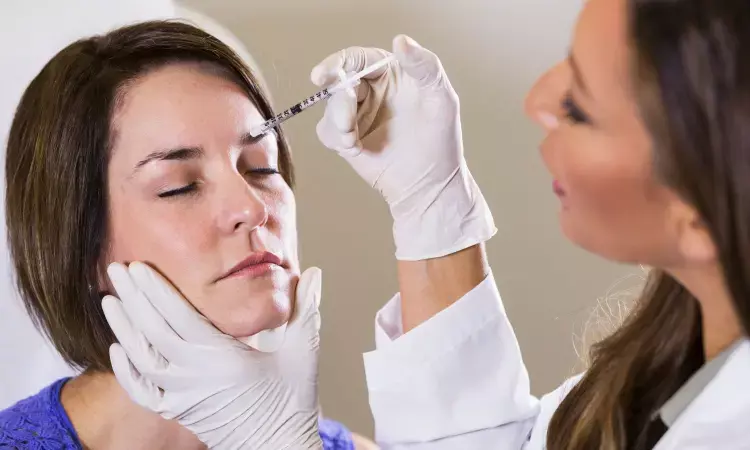- Home
- Medical news & Guidelines
- Anesthesiology
- Cardiology and CTVS
- Critical Care
- Dentistry
- Dermatology
- Diabetes and Endocrinology
- ENT
- Gastroenterology
- Medicine
- Nephrology
- Neurology
- Obstretics-Gynaecology
- Oncology
- Ophthalmology
- Orthopaedics
- Pediatrics-Neonatology
- Psychiatry
- Pulmonology
- Radiology
- Surgery
- Urology
- Laboratory Medicine
- Diet
- Nursing
- Paramedical
- Physiotherapy
- Health news
- Fact Check
- Bone Health Fact Check
- Brain Health Fact Check
- Cancer Related Fact Check
- Child Care Fact Check
- Dental and oral health fact check
- Diabetes and metabolic health fact check
- Diet and Nutrition Fact Check
- Eye and ENT Care Fact Check
- Fitness fact check
- Gut health fact check
- Heart health fact check
- Kidney health fact check
- Medical education fact check
- Men's health fact check
- Respiratory fact check
- Skin and hair care fact check
- Vaccine and Immunization fact check
- Women's health fact check
- AYUSH
- State News
- Andaman and Nicobar Islands
- Andhra Pradesh
- Arunachal Pradesh
- Assam
- Bihar
- Chandigarh
- Chattisgarh
- Dadra and Nagar Haveli
- Daman and Diu
- Delhi
- Goa
- Gujarat
- Haryana
- Himachal Pradesh
- Jammu & Kashmir
- Jharkhand
- Karnataka
- Kerala
- Ladakh
- Lakshadweep
- Madhya Pradesh
- Maharashtra
- Manipur
- Meghalaya
- Mizoram
- Nagaland
- Odisha
- Puducherry
- Punjab
- Rajasthan
- Sikkim
- Tamil Nadu
- Telangana
- Tripura
- Uttar Pradesh
- Uttrakhand
- West Bengal
- Medical Education
- Industry
Botox application lighten skin on forehead by reducing melanin index: Study

A study published in the International Journal of Dermatology written by Duygu Erdil MD and colleagues measured the melanin index (MI) before and 15 days after a uniform dose of onabotulinumtoxinA injections to the forehead, glabella, and crow’s feet region in 31 patients of mean age 39 years.
These patients were mainly females with Fitzpatrick's skin type 1 to 3. The researchers noted a significant reduction in the forehead and upper face MI at 15 days.
Explaining the study background, researchers said that Botulinum toxin injection is the most commonly used cosmetic procedure for treating dynamic wrinkles. It also has a lightening effect on the skin. They elaborated further that this effect is due to muscle innervation blockage. Still, there is a lack of data on quantifying changes in the number of melanin levels.
To research this background, researchers included 31 patients who presented to the clinic of a tertiary hospital for the treatment of wrinkles using botulinum toxin injection.
The sites where the injection was injected were the patient's forehead, glabellar, and crow's feet region. Mexameter® MX 18 was used to measure the melanin index (MI).
The study results could be summarised as follows:
- Following botulinum toxin treatment, there was a decrease in the forehead and upper face MI.
- The upper face total baseline MI was lower in the Glogau 1 group than Glogau 2 group.
- The forehead 15th-day MI was lower in the Glogau 1 group than in the Glogau 2, 3, and 4 groups.
They discussed that applying Botulinum toxin to healthy skin causes facial skin lightening by reducing MI in wrinkle treatment.
According to our study findings, the decrease was more pronounced in the forehead. This region is the most vulnerable to sun exposure, they said.
Younger people (Glogau type 1 group) benefit more from this lightning effect.
Neuromodulators may promote facial lightening, especially in those with milder photoaging, although additional research with longer follow-up time is needed.
Further reading:
BDS, MDS in Periodontics and Implantology
Dr. Aditi Yadav is a BDS, MDS in Periodontics and Implantology. She has a clinical experience of 5 years as a laser dental surgeon. She also has a Diploma in clinical research and pharmacovigilance and is a Certified data scientist. She is currently working as a content developer in e-health services. Dr. Yadav has a keen interest in Medical Journalism and is actively involved in Medical Research writing.
Dr Kamal Kant Kohli-MBBS, DTCD- a chest specialist with more than 30 years of practice and a flair for writing clinical articles, Dr Kamal Kant Kohli joined Medical Dialogues as a Chief Editor of Medical News. Besides writing articles, as an editor, he proofreads and verifies all the medical content published on Medical Dialogues including those coming from journals, studies,medical conferences,guidelines etc. Email: drkohli@medicaldialogues.in. Contact no. 011-43720751


